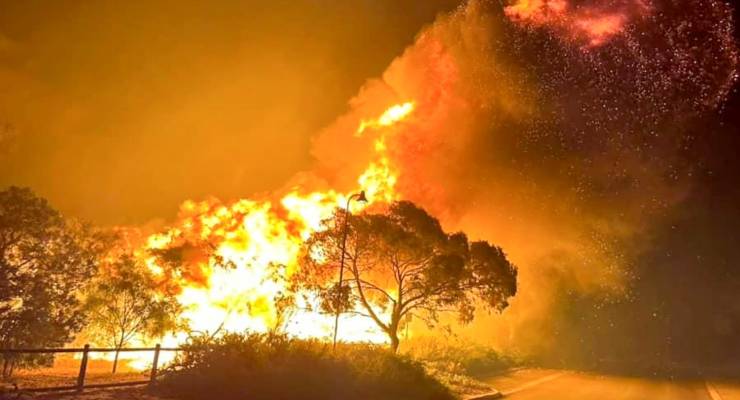
As our oceans hit record heat and steadily acidify, accelerating the melting of Antarctic ice, Australia’s traditional news media seems to have got its reporting on the escalating crisis precisely — literally — back to front.
The result? We’re getting more much-needed news about the climate crisis. But, in the headlines, the fossil-fuel-powered global denialist movement continues to throw its dead hand over Australia’s political debate.
The nightly news closes off with increasingly shrill warnings in the traditionally feel-good weather segment. The soft centre of the bulletin brings a cultural update: the Moomba Parade, suddenly made too dangerous to proceed by extreme heat, is cancelled.
But up front, in the “real” news, it’s all reported like we are stuck a decade back in an endless “carbon-tax” loop, with an all-too-serious head-nodding over the latest denialist tropes of a “ute tax” and the Opposition’s impractical nuclear rescue plan.
Suddenly, we’ve found ourselves at a moment where the cycle of global heating is turning quickly enough to align with the news cycle. As a result, the climate crisis is becoming integrated into daily weather reporting as heat levels lurch with an urgency that’s too hard to ignore — as with, for example, the now famous graph of shocking record ocean heating levels making a regular appearance in the weather commentary.
The research by the Intergovernmental Panel on Climate Change has given us the evidence journalists need to tie it all up: its most recent (2021) comprehensive report on the physical science of climate confirmed that those extreme weather events that generate drama for news are being triggered by the changing climate.
There’s evidence, too, that the extreme events cause their own climate feedback loops on what should be a news-friendly time scale, like the linked step from Australia’s 2019 bushfires to our subsequent La Nina summers.
Despite the scientific conclusion, soft news reporting treads lightly, referencing the extreme weather that led to, say, the cancellation of the Moomba parade, but steering clear of making clear the climate crisis that caused it. The ABC, for example, was able to report the story at length without ever mentioning the words “climate” or “warming”.
But when it comes to reporting the necessary policy responses to the climate crisis, our press corps does not so much cautiously tip-toe through the evidentiary tulips, as trample heedlessly over the top, in an eager lunge for the safe place where, free of controversy, they can natter savvily about the politics of politics.
Our commentariat is eager to nod sagely at Dutton’s attempt to spike the Federal Government’s proposed New Vehicles Efficiency Standard needed to cut emissions. Smart politics, they admiringly conclude, despite knowing how Australia’s decade of inaction has contributed to the planetary crisis, not to mention the inconvenience to motorists wanting the benefits of choice and infrastructure comparable nations enjoy (as Climate Minister Chris Bowen was eager to stress over the weekend).
It’s all just part of the Canberra game, after all, with the media thinking they’re keeping score — and maybe dropping in to call a foul every now and then.
But the Opposition’s talking points getting so much traction — from “ute tax” to nuclear daydreams — aren’t just about scoring a few points in the long road to the 2025 election. They’re about stopping climate action now. And by treating it as “politics as usual”, Australia’s political reporters are helping them along.
The first step is recognising that the Opposition is just part of a broad campaigning coalition supporting the fossil-fuel status quo — along with self-interested lobby groups like Japanese ICE car manufacturers (neutrally referred to as “the industry” in much of the media commentary) or astroturfed campaign groups like the ones largely driving the opposition to solar generators and the new renewables-friendly electricity grid in regional Australia. (Credit to The Sydney Morning Herald’s Peter Hartcher who recognised the scope of the campaign on Insiders‘ otherwise exclusively party-politics discussion this past weekend.)
Dutton’s attack on emission standards is a revival of one of the favoured denialist approaches: NMP. It’s not my problem — nothing we can do can make any difference and, with a wave of a rhetorical wand, can look like it may well make things worse.
Similarly, despite News Corp’s attempts to make us take Dutton’s nuclear Australia seriously, it, too, is just a call to inaction by other means. It’s a variation of Morrison’s self-satisfied “technology, not taxes” solution back in 2021, that held out the promise (to his back-bench and National Party allies primarily) that Australia could just wait out the climate crisis until it was rescued by the discovery of others.
The trouble is (for those who care about the planet, at least) the accelerating climate crisis won’t wait for technology — or Australia’s political reporters — to catch up.
Maybe, it’s time to open the news with the weather report.








Crikey is committed to hosting lively discussions. Help us keep the conversation useful, interesting and welcoming. We aim to publish comments quickly in the interest of promoting robust conversation, but we’re a small team and we deploy filters to protect against legal risk. Occasionally your comment may be held up while we review, but we’re working as fast as we can to keep the conversation rolling.
The Crikey comment section is members-only content. Please subscribe to leave a comment.
The Crikey comment section is members-only content. Please login to leave a comment.